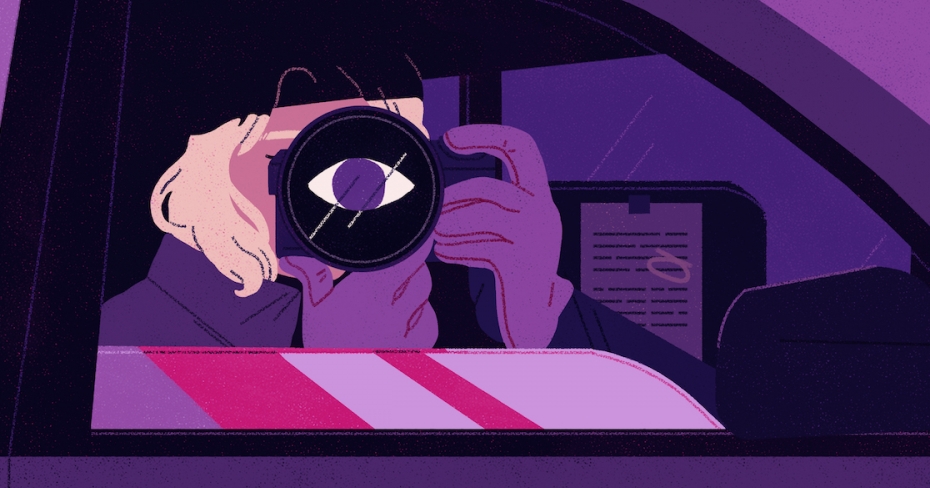The stealthy way insurance companies evaluate some claims: private investigators
By: Lisa Coxon on January 29, 2021
In order for Megan Potvin to do her job well, she must arrive at the crack of dawn. It’s crucial for her to go undetected, so she needs to find a place to park before anyone on the street decides to leave their home for the day. “The fewer neighbours who see me,” she says, “the less chance I have of blowing my cover.”
Once she’s settled, it’s Potvin’s job to gather as much information as possible about her subject’s daily routine. What time do they leave the house each day? What time do they return? What vehicle are they driving? These are the kinds of questions Potvin needs answers to. And she’s going to get them by turning on a video camera.
“From the second the subject comes outside, the filming has started,” says Potvin. “We film them exiting their house, entering their vehicle. We follow them wherever they go. If they enter a building or shopping centre, we enter as well. We stay with them all day until they return home. Once they do, it is safe to discontinue surveillance for the day.”
Potvin is a private investigator and founder of Platinum Investigation, located in eastern Ontario. Platinum Investigation is hired by insurance companies to surveil individuals who may be suspected of committing insurance fraud. For instance, let’s say you are injured badly in a car accident and you make a claim with your auto insurance provider. You tell the insurer that you sustained a serious back injury in the accident. You cannot bend down. You cannot lift things. And so you will need to be off work for a prolonged period of time while the insurance company pays for things like medical expenses and income replacement.
If your insurance company has any doubt that you might be faking your injury or the severity of it, it could hire someone like Potvin to follow you around and gather video and photographic evidence. In fact, it’s common practice for insurance companies to do just that. So if you’ve ever felt like you were being followed after making an insurance claim, there’s a good chance it wasn’t just your imagination.
Investigators can collect information about you without your consent
It used to be that insurance companies would task the Insurance Bureau of Canada (IBC)’s investigative department to look into suspected fraudulent claims. But over the years, as insurance companies wanted to have more control over these investigations, they’ve begun to outsource this work to private investigators.
To the untrained ear, sending a private investigator to follow someone may sound, at best, like an infringement on someone’s privacy, and at worst, illegal. But if it’s for the purpose of an investigation, surveilling someone is a completely legal endeavour.
“The insurance company uses the investigator as an agent,” says Sivan Tumarkin, managing partner and co-founder of Toronto-based law firm Samfiru Tumarkin LLP. “It’s no different than if you said your back hurts and the insurance company hires a doctor to assess you.”
Insurance companies don’t need your consent, either, to surveil you. Brad Weldon, former director of policy at the Office of the Information and Privacy Commissioner for British Columbia says that in B.C., the collection of personal information is subject to the province’s Personal Information and Protection Act. Other provinces have their own versions of this law.
The insurance company uses the investigator as an agent. It’s no different than if you said your back hurts and the insurance company hires a doctor to assess you
“Generally, under the Act, you need consent from the individual in order to collect their personal information,” says Weldon, who is now Chief Privacy Officer and Legal Counsel at the University of Victoria. “But there are provisions that allow for collection use and disclosure without consent, and they’re very specific. One that might apply is that it is necessary for the purpose of an investigation.”
The thinking behind that rule is that if you had to give consent and were therefore aware that a private investigator was following your every move, you might not behave in the same way as if you were aware. “Insurance companies might not have confidence that you would behave in a way that accurately reflected whatever it was that they were trying to observe,” says Weldon.
And it’s for that very reason that insurance companies don’t want you to know that they’ve hired someone to surveil you, and don’t make it public knowledge that they conduct this kind of surveillance as part of their day-to-day operations.
“It’s the last thing they want you to know,” says Tumarkin. “They don’t want you to get afraid of them. They don’t want you to not make a claim. They advertise themselves as being your friend and your safety blanket if anything happens. And instead, as soon as you make a claim, then they try to undermine you.”
That said, once the insurance company’s investigation is complete, you can access all of the information they collected on you. “You can request a copy and they have to provide it to you,” says Weldon. “That’s something that probably people don’t know.”
Why would an insurance company want to investigate someone?
The main reason insurance companies hire private investigators to follow claimants around is to see if they submitted a fraudulent claim. In other words, to see if their story is credible, or if they might be lying.
“We hope to gather as much video evidence as possible to support or debunk the integrity of the claims being made,” explains Potvin. Usually, she says, those being investigated are claimants seeking a large amount of compensation or those who seem to have flaws in their story.
Tumarkin echoes this. “It’s generally for any claim where the insurer identifies red flags, such as conflicting information given by the insured, if the scenario doesn’t make sense, or anything that triggers questions in their mind as to the credibility of the claimant,” he says. “You definitely see surveillance in high-value claims, but you see them in lower and moderate value claims as well, depending on those red-flag triggers.”
The longest Tumarkin has seen someone be surveilled is 30 days, though it really depends on the situation.
It’s the last thing they want you to know. They don’t want you to get afraid of them. They don’t want you to not make a claim
“Some days the investigator will get nothing, and some days they’ll get video footage for 10 hours,” he says. “It really varies.”
Some might find this tactic somewhat predatory. Others view it as a necessary anti-fraud measure. Henry Tso, Director of Forensic and Litigation Support Services at MNP LLP, used to work at IBC as the VP of Investigative Services. He believes private investigators are a crucial cog in the insurance machine who help to uncover instances of fraud.
Insurance fraud is often touted as the number-one culprit behind rising insurance rates. Insurance companies argue that they’re bleeding money due to fraudulent claims and need to recoup that money in what they collect from consumers. According to the Insurance Bureau of Canada, insurance fraud costs Canadians about $1 billion a year in increased premiums.
“Investigators should exist in the insurance industry,” says Tso. “Because right now law enforcement doesn’t have the capacity to investigate fraud.”
What are investigators allowed and not allowed to do when surveilling someone?
While the law allows for people to be surveilled for the purpose of an investigation, there are still rules private investigators must follow when they’re on the job.
For starters, investigators cannot contact you directly, trespass on your property, or interact with you in any way. They are allowed to videotape you, but they can’t do anything with the footage besides turn it over to the insurance company.
“The only thing you can do from a recourse standpoint,” explains Tumarkin, “is if you feel threatened or harassed, you can take legal action against that person or against the insurance company. But beyond that, if you’re not harassed, you’re not bullied, anything like that, there’s nothing you can do about it. It’s part of the process.”
Harassment, however, can be subjective — and in Tumarkin’s experience, isn’t necessarily something that happens often with these kinds of investigations.
“For the most part private investigators are generally professionals,” he says. “They don’t want any complaints. They want to be able to get more contracts from the insurance company.”
So if you feel like you’re being followed after making an insurance claim, it’s in your best interest to just assume that someone is watching you.
I understand why insurance companies are allowed to do it. But I don’t know if it’s necessarily fair
“To my clients, I always say just be very careful in terms of what you do,” says Tumarkin. “Because there could be someone who could be videotaping you. The law allows it.”
As for whether or not the law should allow for it, well, that’s another question.
“I understand why insurance companies are allowed to do it,” says Tumarkin. “But I don’t know if it’s necessarily fair. There is a power and money imbalance and I think that the tools in the arsenal of insurance companies are tools that individuals don’t have. It’s an unequal fight.”
Maybe so. But so long as private investigators act within their bounds, they’re just doing what they were hired to do.
As for Potvin, she knows the limitations of her role well. Making direct contact with the claimant is prohibited, yes, but an experienced investigator like herself knows there are other ways to gather the information she needs.
In some situations, she’ll approach the neighbours of the subject “under a pretext” in order to secure whatever information she can. “In simple terms, a pretext is a lie,” says Potvin. “We are allowed to say anything we need to obtain information.”
The only thing she can’t lie about, however, is the fact that she’s a private investigator — but only if she’s asked outright. “If they don't ask, we can pretend to be anyone we want,” she says. “I enjoy using a flower delivery service. I tell the neighbours we have been trying to deliver flowers to ‘X’ address and have had no luck. They usually begin to tell me when our subject is home, what time would work best to catch them at home, and what vehicles should be in the driveway if they are home. If you're friendly, you can obtain any information from the neighbours.
“It's genius,” she says. “They have no idea.”
With files from Jessica Mach.
Illustration by Jeannie Phan.


